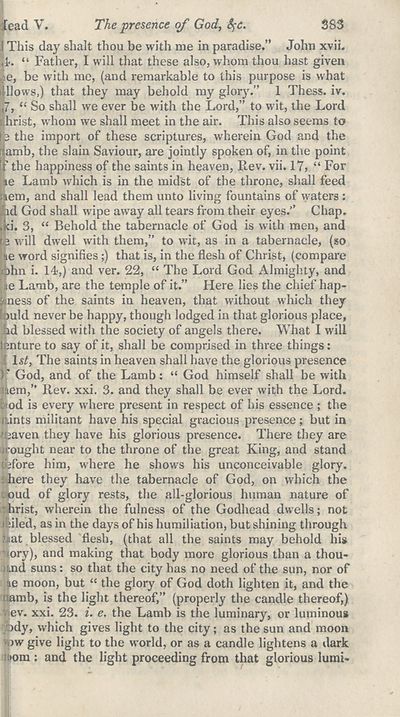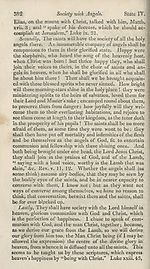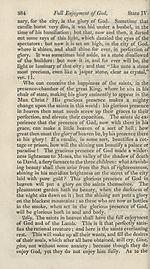Download files
Complete book:
Individual page:
Thumbnail gallery: Grid view | List view

• •
lead V. The presence of God, SfC. 383
This day shalt thou be with me in paradise.” John xvii.
t. “ Father, I will that these also, whom thou hast given
e, be with me, (and remarkable to this purpose is what
Hows,) that they may behold my glory.” 1 Thess. iv.
7, “ So shall we ever be with the Lord,” to wit, the Lord
hrist, w hom we shall meet in the air. This also seems to
i the import of these scriptures, wherein God and the
amb, the slain Saviour, are jointly spoken of, in the point
* the happiness of the saints in heaven, Rev. vii. 17> “ For
ic Lamb which is in the midst of the throne, shall feed
em, and shall lead them unto living fountains of waters:
id God shall wipe away all tears from their eyes.’’ Chap,
d. 3, “ Behold the tabernacle of God is with men, and
5 wdll dwell with them,” to wit, as in a tabernacle, (so
e word signifies;) that is, in the flesh of Christ, (compare
>hn i. 14;,) and ver. 22, “ The Lord God Almighty, and
e Lamb, are the temple of it.” Here lies the chief hap-
ness of the saints in heaven, that without which they
mid never be happy, though lodged in that glorious place,
id blessed with the society of angels there. What I will
:nture to say of it, shall be comprised in three things;
1st, The saints in heaven shall have the glorious presence
’ God, and of the Lamb: “ God himself shall be with
em,” Rev. xxi. 3. and they shall be ever with the Lord,
od is every where present in respect of his essence ; the
Is militant have his special gracious presence; but in
en they have his glorious presence. There they are
^ht near to the throne of the great King, and stand
e him, where he shows his unconceivable glory,
e they have the tabernacle of God, on which the
l of glory rests, the all-glorious human nature of
st, wherein the fulness of the Godhead dwells; not
d, as in the days of his humiliation, but shining through
blessed flesh, (that all the saints may behold his
'), and making that body more glorious than a thou-
suns: so that the city has no need of the sun, nor of
noon, but “ the glory of God doth lighten it, and the
b, is the light thereof,” (properly the candle thereof,)
xxi. 23. i. e. the Lamb is the luminary, or luminous
', which gives light to the city; as the sun and moon
ipw give light to the world, or as a candle lightens a dark
loom : and the light proceeding from that glorious lumi*
lead V. The presence of God, SfC. 383
This day shalt thou be with me in paradise.” John xvii.
t. “ Father, I will that these also, whom thou hast given
e, be with me, (and remarkable to this purpose is what
Hows,) that they may behold my glory.” 1 Thess. iv.
7, “ So shall we ever be with the Lord,” to wit, the Lord
hrist, w hom we shall meet in the air. This also seems to
i the import of these scriptures, wherein God and the
amb, the slain Saviour, are jointly spoken of, in the point
* the happiness of the saints in heaven, Rev. vii. 17> “ For
ic Lamb which is in the midst of the throne, shall feed
em, and shall lead them unto living fountains of waters:
id God shall wipe away all tears from their eyes.’’ Chap,
d. 3, “ Behold the tabernacle of God is with men, and
5 wdll dwell with them,” to wit, as in a tabernacle, (so
e word signifies;) that is, in the flesh of Christ, (compare
>hn i. 14;,) and ver. 22, “ The Lord God Almighty, and
e Lamb, are the temple of it.” Here lies the chief hap-
ness of the saints in heaven, that without which they
mid never be happy, though lodged in that glorious place,
id blessed with the society of angels there. What I will
:nture to say of it, shall be comprised in three things;
1st, The saints in heaven shall have the glorious presence
’ God, and of the Lamb: “ God himself shall be with
em,” Rev. xxi. 3. and they shall be ever with the Lord,
od is every where present in respect of his essence ; the
Is militant have his special gracious presence; but in
en they have his glorious presence. There they are
^ht near to the throne of the great King, and stand
e him, where he shows his unconceivable glory,
e they have the tabernacle of God, on which the
l of glory rests, the all-glorious human nature of
st, wherein the fulness of the Godhead dwells; not
d, as in the days of his humiliation, but shining through
blessed flesh, (that all the saints may behold his
'), and making that body more glorious than a thou-
suns: so that the city has no need of the sun, nor of
noon, but “ the glory of God doth lighten it, and the
b, is the light thereof,” (properly the candle thereof,)
xxi. 23. i. e. the Lamb is the luminary, or luminous
', which gives light to the city; as the sun and moon
ipw give light to the world, or as a candle lightens a dark
loom : and the light proceeding from that glorious lumi*
Set display mode to:
![]() Universal Viewer |
Universal Viewer | ![]() Mirador |
Large image | Transcription
Mirador |
Large image | Transcription
| Antiquarian books of Scotland > Religion & morality > Human nature in its fourfold state > (401) |
|---|
| Permanent URL | https://digital.nls.uk/118588508 |
|---|
| Description | Thousands of printed books from the Antiquarian Books of Scotland collection which dates from 1641 to the 1980s. The collection consists of 14,800 books which were published in Scotland or have a Scottish connection, e.g. through the author, printer or owner. Subjects covered include sport, education, diseases, adventure, occupations, Jacobites, politics and religion. Among the 29 languages represented are English, Gaelic, Italian, French, Russian and Swedish. |
|---|

